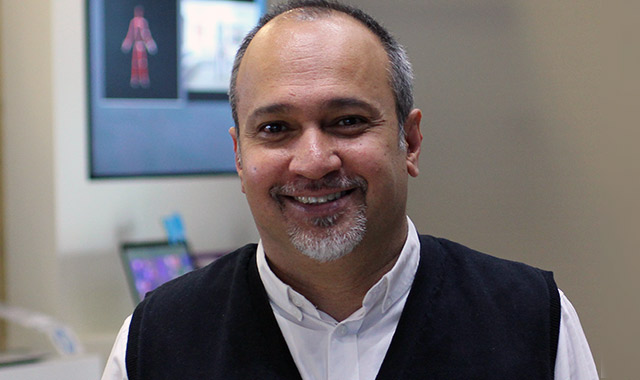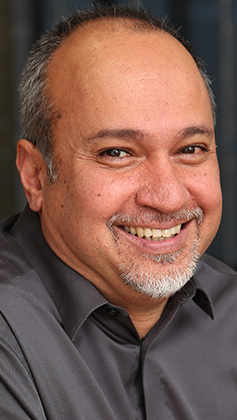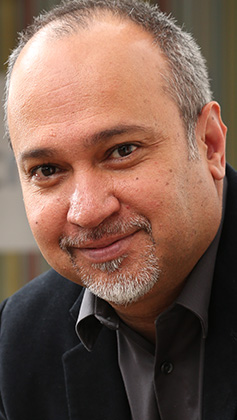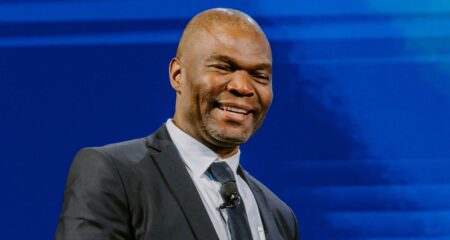
There is a always a buzz at Microsoft South Africa’s head office in Johannesburg’s leafy Bryanston suburb. This week, the buzz is the appointment of new MD Zoaib Hoosen.
Like his predecessor, Mteto Nyati, Hoosen, 49, is a former IBM executive. He joined Microsoft in 2010 as enterprise and partner group director, and was named chief operating officer in 2013.
As we shake hands, Hoosen seems relaxed and ready to take on the challenge. Before we sit down in one of the company’s many meeting rooms, he pulls out his smartphone to check a message — not surprisingly a Windows Phone-powered Nokia Lumia device.
As we settle in, I ask about where Hoosen grew up.
“Down in Durbs,” he says. He recalls the so-called Casbah area where he lived with fond memories. “It had an eclectic mix of characters.”
The Casbah covered the area from Albert Park down to First Avenue in Greyville and stretched through Berea and down to Grey Street.
He tells the story of his late father-in-law, who referred to the era he grew up in as “a time when there were gentlemen thugs”. Hoosen says he “got his early education on the streets of Durban”.
When it came time to choose a career, Hoosen’s generation tended to look at traditional careers such as teaching, medicine and law, “things that would allow you to be self-employed”.
 These career options did not excite the young Hoosen.
These career options did not excite the young Hoosen.
He decided instead to study computer science as part of a BSc degree at the University of Durban-Westville.
His family was sceptical about his career choice, especially given that his peers were exploring more traditional options. Hoosen says he had a rebellious streak. He went onto to major in mathematics and computer science.
Halfway through his third year of studies, Hoosen began to have doubts. He felt what he was studying might not be for him. “In those days, you had to book time to use a computer. You got 30 minutes a week if you were lucky and it just did not seem to be my thing.”
His sister encouraged him to persevere and other members of his family, who had once opposed the idea, had become broadly supportive of his career choice. He decided to see it through.
After graduating, Hoosen found job prospects in Durban bleak. He received three job offers, but two were in the textile and manufacturing industries, while the third one did not pay a salary. “It was basically a six month unpaid internship.”
Like many youngsters who grow up and graduate in Durban, he moved to Johannesburg in search of greener pastures.
With just R250 in his pocket and new to the big city, Hoosen signed up for a four-month Cobol programming course at Van Zyl & Pritchard. He then found work at IBM through the school’s placement programme. It was 1989.
Other than Cobol, Hoosen was exposed to Pascal and also learnt IBM’s Fortran and Rexx mainframe programming languages.
It was a steep learning curve. It was at IBM that he learnt the value of “respect for the individual” — the words decorated a poster in the office. “It was a fantastic time. They really pushed you and it was an exciting and dynamic time to be in the technology industry.”
It took Hoosen two years of hard graft before he was promoted to systems engineer — a position that came with perks like a company car. He fondly remembers his first car, a white Opel Monza.
It was during his early years at IBM that the technology bug really bit. He loved the potential impact technology could have on business.
Indeed, Hoosen also had an interest in the business side of tech. This pushed him to explore a career beyond the nuts and bolts of software programming.
 By the time the mid-1990s rolled around, the Internet revolution was getting started and the personal computer industry was booming. Hoosen was leading an internal project roll out this “new technology” to replace mainframe-based “dumb terminals” at IBM. It changed his career path. He was later offered the chief information officer role at IBM.
By the time the mid-1990s rolled around, the Internet revolution was getting started and the personal computer industry was booming. Hoosen was leading an internal project roll out this “new technology” to replace mainframe-based “dumb terminals” at IBM. It changed his career path. He was later offered the chief information officer role at IBM.
He later graduated to become head of the key IT outsourcing business. It was here that he managed to satisfy his passion for problem-solving in business. “I saw [sales] deals as big problems. These were complex negotiations, multimillion-dollar deals, and I loved the cut and thrust of it.”
There was also an 18-month stint at IBM in the UK, where he moved with his family.
But he’d spent more than 20 years working for IBM. It was time to take stock and reassess. “I was really interested in where Microsoft was going,” he says. The software company felt fresh, and different to IBM. It also had some challenges it had to overcome and this was exciting for someone who loved solving problems. He was offered and accepted the role of enterprise leader at Microsoft and within two years had taken on the role of chief operating officer. Now, a year later, he’s running the shop.
Hoosen jokes that he’s actually only had one job change and that was when he moved from IBM to Microsoft.
When he’s not focused on the job, or tinkering with technology, Hoosen loves “old-school rock” — Dire Straits, for example. “My daughter will probably frown when I say that, he says, before adding — perhaps for her — that he also enjoys the odd contemporary band.
Though he loves technology — while travelling, he consumes all of that music on his smartphone — he says that spending time with his wife and daughter is still his top priority.
As the interview is wrapping up, Hoosen begins waxing lyrical on how technology could help South Africa.
“We are blessed with so many amazing things in this country, but we are also stuck with a bunch of challenges… When I look at where we are, there are so many challenges to overcome. I see an intersection where, with the advances in technology, we can solve many of these problems.”
Always the problem solver, then. — © 2014 NewsCentral Media




